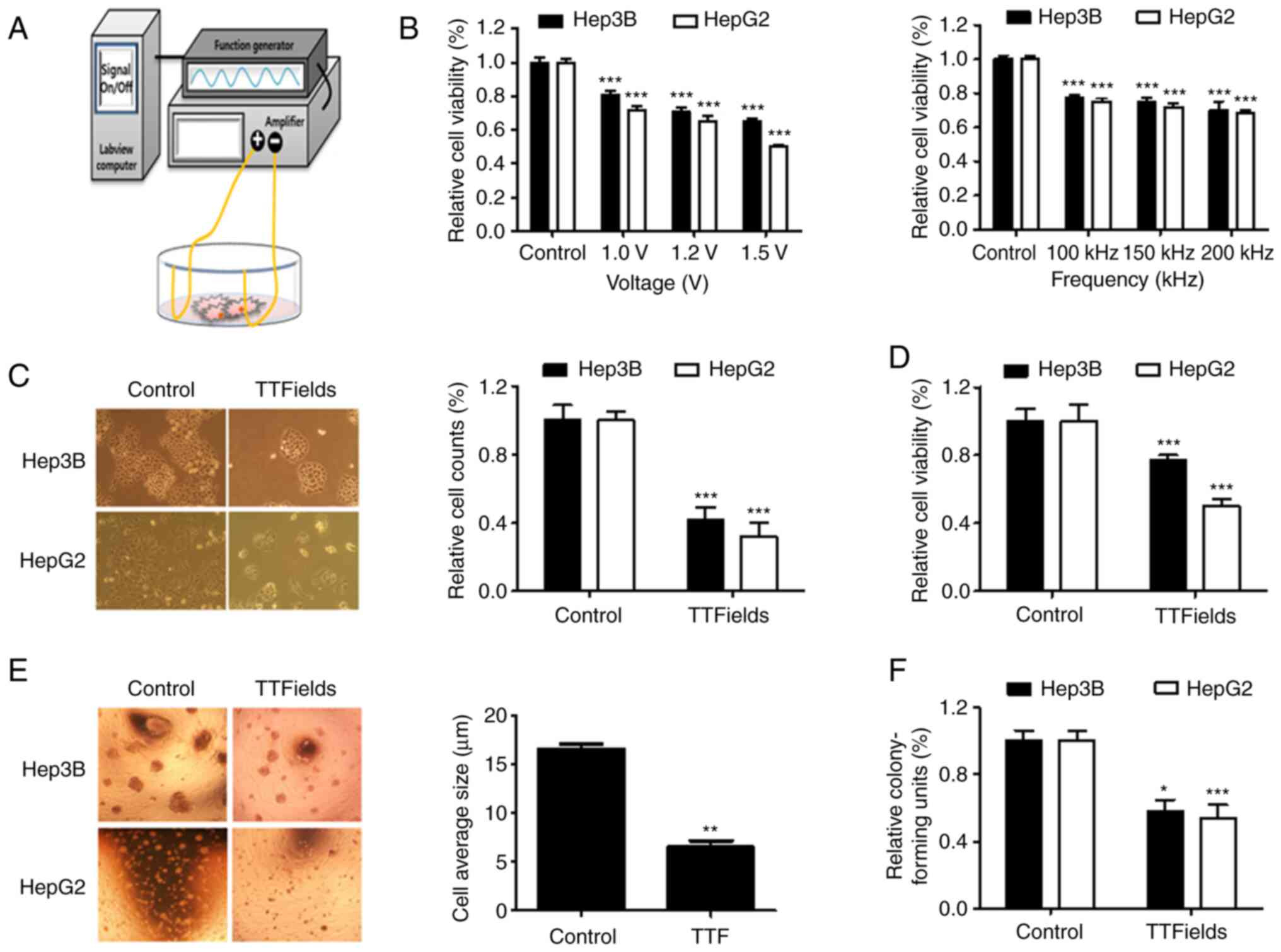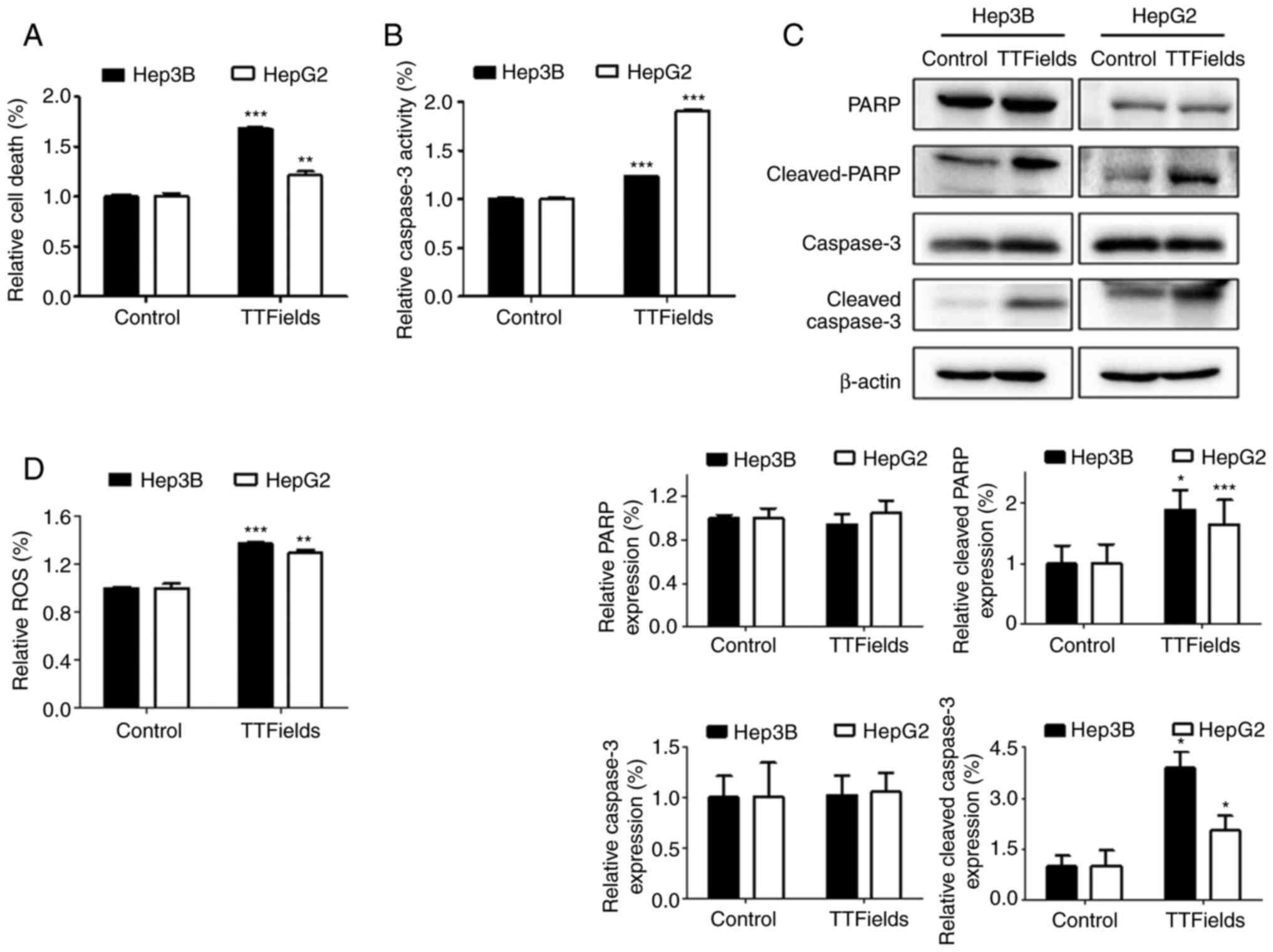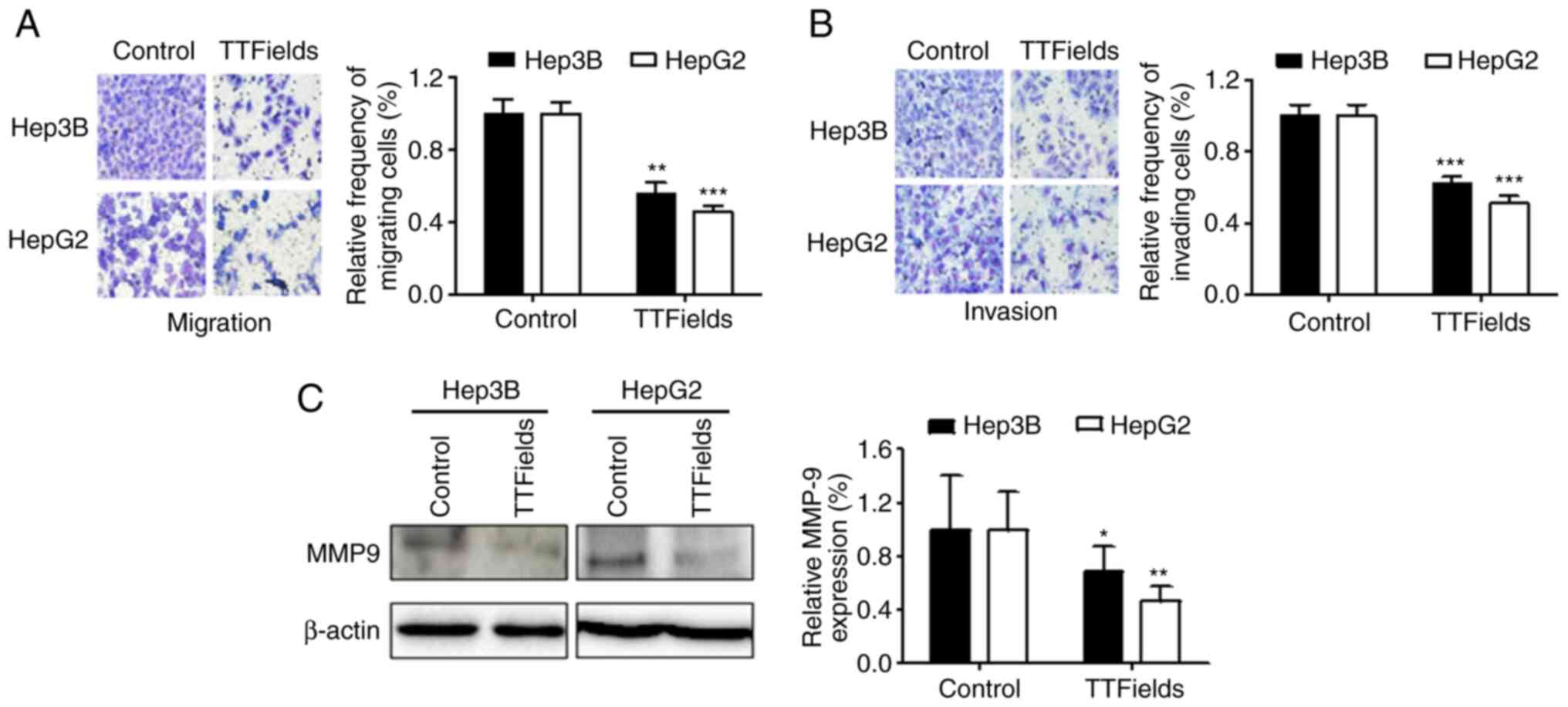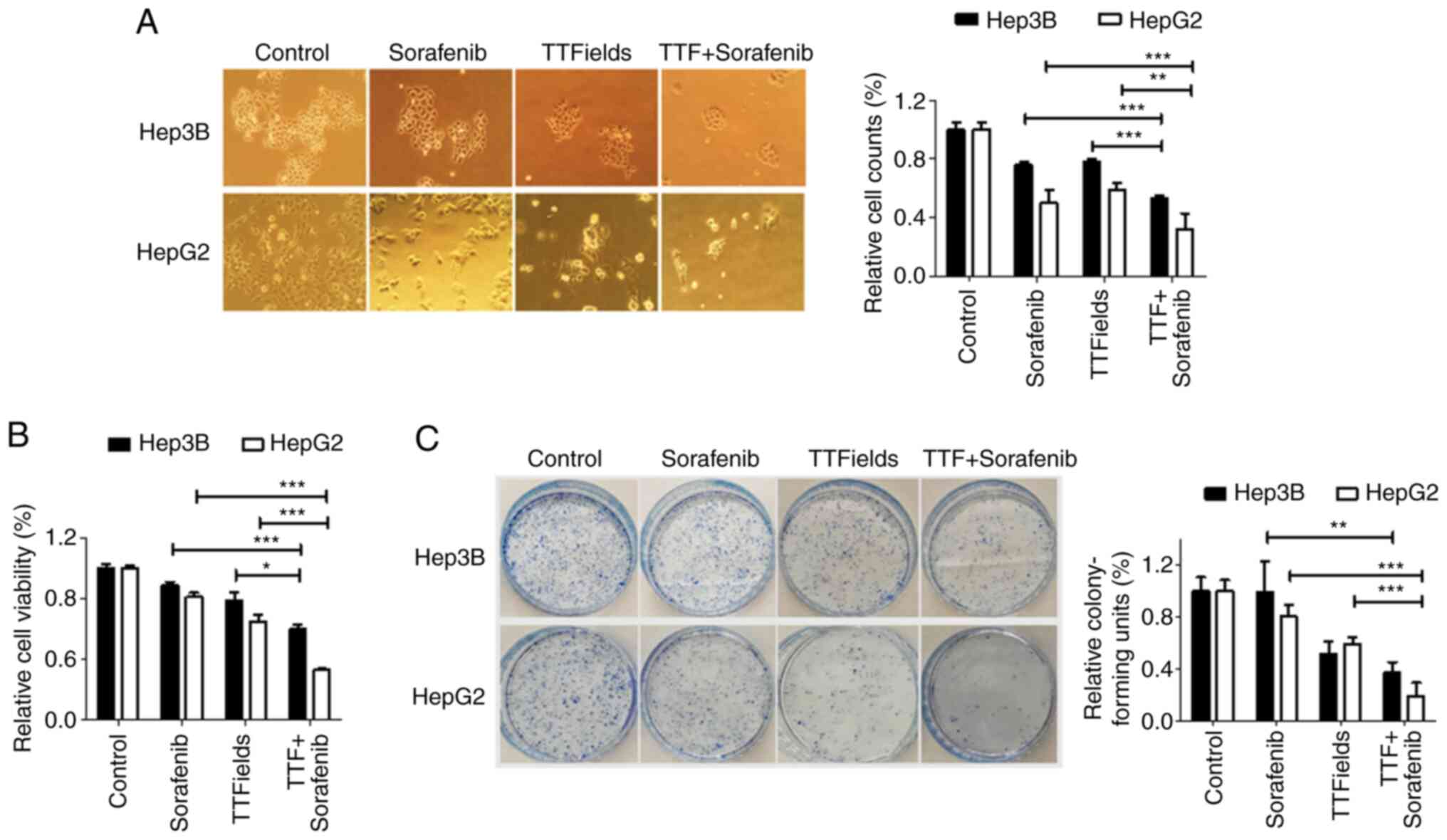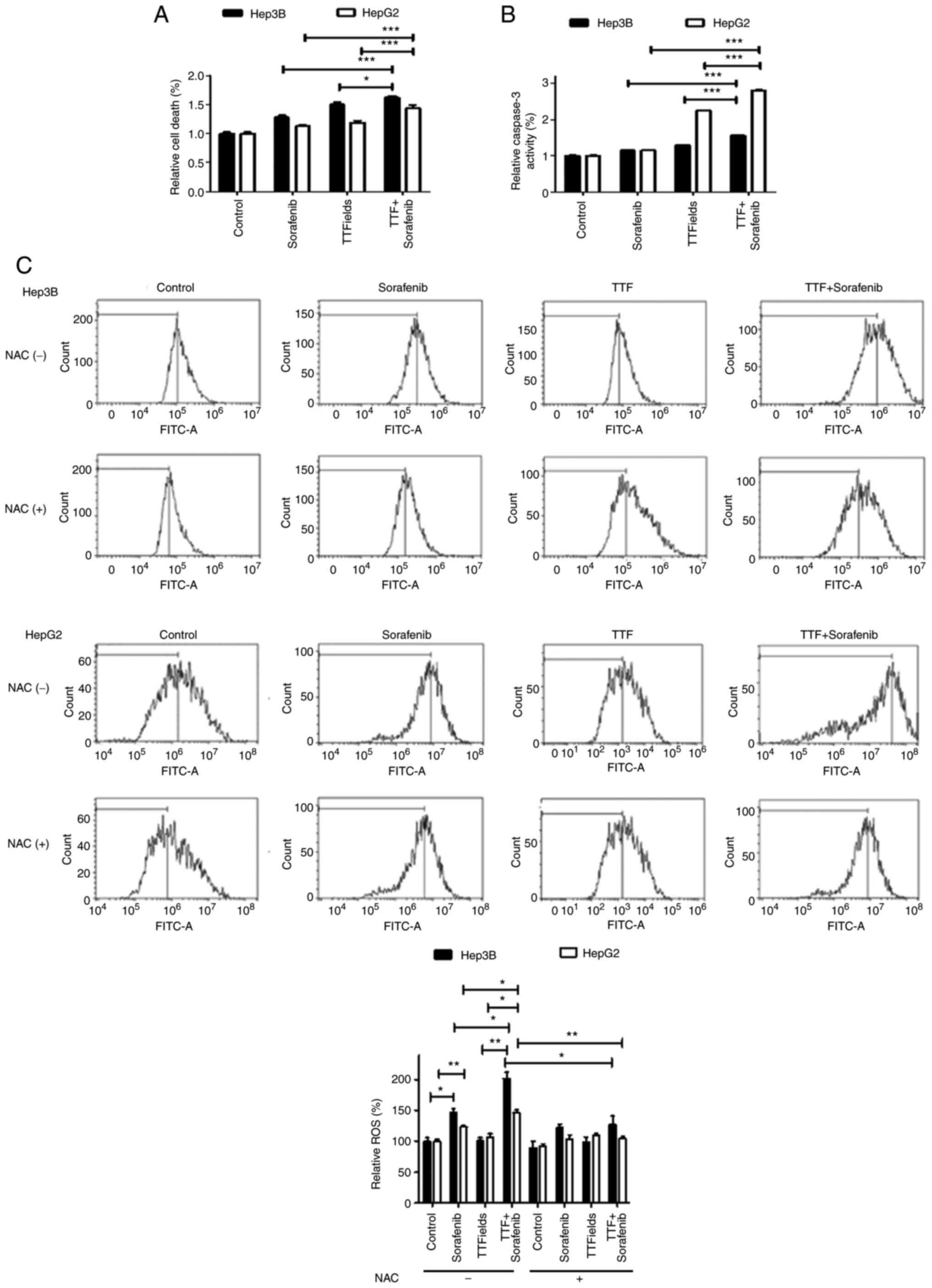|
1
|
Inokawa Y, Inaoka K, Sonohara F, Hayashi
M, Kanda M and Nomoto S: Molecular alterations in the
carcinogenesis and progression of hepatocellular carcinoma: Tumor
factors and background liver factors. Oncol Lett. 12:3662–3668.
2016. View Article : Google Scholar : PubMed/NCBI
|
|
2
|
Fernandez-Rodriguez CM and
Gutierrez-Garcia ML: Prevention of hepatocellular carcinoma in
patients with chronic hepatitis B. World J Gastrointest Pharmacol
Ther. 5:175–182. 2014. View Article : Google Scholar : PubMed/NCBI
|
|
3
|
Buendia MA and Neuveut C: Hepatocellular
carcinoma. Cold Spring Harb Perspect Med. 5:a0214442015. View Article : Google Scholar : PubMed/NCBI
|
|
4
|
Pless M and Weinberg U: Tumor treating
fields: Concept, evidence and future. Expert Opin Investig Drugs.
20:1099–1106. 2011. View Article : Google Scholar : PubMed/NCBI
|
|
5
|
Mun EJ, Babiker HM, Weinberg U, Kirson ED
and Von Hoff DD: Tumor-treating fields: A fourth modality in cancer
treatment. Clin Cancer Res. 24:266–275. 2017. View Article : Google Scholar : PubMed/NCBI
|
|
6
|
Gera N, Yang A, Holtzman TS, Lee SX, Wong
ET and Swanson KD: Tumor treating fields perturb the localization
of septins and cause aberrant mitotic exit. PLoS One.
10:e01252692015. View Article : Google Scholar : PubMed/NCBI
|
|
7
|
Kirson ED, Gurvich Z, Schneiderman R,
Dekel E, Itzhaki A, Wasserman Y, Schatzberger R and Palti Y:
Disruption of cancer cell replication by alternating electric
fields. Cancer Res. 64:3288–3295. 2004. View Article : Google Scholar : PubMed/NCBI
|
|
8
|
Durand DM and Bikson M: Suppression and
control of epileptiform activity by electrical stimulation: A
review. Proc IEEE. 89:1065–1082. 2001. View
Article : Google Scholar
|
|
9
|
Kirson ED, Dbaly V, Tovarys F, Vymazal J,
Soustiel JF, Itzhaki A, Mordechovich D, Steinberg-Shapira S,
Gurvich Z, Schneiderman R, et al: Alternating electric fields
arrest cell proliferation in animal tumor models and human brain
tumors. Proc Natl Acad Sci USA. 104:10152–10157. 2007. View Article : Google Scholar : PubMed/NCBI
|
|
10
|
Giladi M, Schneiderman RS, Voloshin T,
Porat Y, Munster M, Blat R, Sherbo S, Bomzon Z, Urman N, Itzhaki A,
et al: Mitotic spindle disruption by alternating electric fields
leads to improper chromosome segregation and mitotic catastrophe in
cancer cells. Sci Rep. 5:180462015. View Article : Google Scholar : PubMed/NCBI
|
|
11
|
Jo Y, Kim EH, Sai S, Kim JS, Cho JM, Kim
H, Baek JH, Kim JY, Hwang SG and Yoon M: Functional biological
activity of sorafenib as a tumor-treating field sensitizer for
glioblastoma therapy. Int J Mol Sci. 19:36842018. View Article : Google Scholar : PubMed/NCBI
|
|
12
|
Kirson ED, Schneiderman RS, Dbaly V,
Tovarys F, Vymazal J, Itzhaki A, Mordechovich D, Gurvich Z, Shmueli
E, Goldsher D, et al: Chemotherapeutic treatment efficacy and
sensitivity are increased by adjuvant alternating electric fields
(TTFields). BMC Med Phys. 9:12009. View Article : Google Scholar : PubMed/NCBI
|
|
13
|
Giladi M, Munster M, Schneiderman RS,
Voloshin T, Porat Y, Blat R, Zielinska-Chomej K, Hååg P, Bomzon Z,
Kirson ED, et al: Tumor treating fields (TTFields) delay DNA damage
repair following radiation treatment of glioma cells. Radiat Oncol.
12:2062017. View Article : Google Scholar : PubMed/NCBI
|
|
14
|
Kim EH, Kim YH, Song HS, Jeong YK, Lee JY,
Sung J, Yoo SH and Yoon M: Biological effect of an alternating
electric field on cell proliferation and synergistic antimitotic
effect in combination with ionizing radiation. Oncotarget.
7:62267–62279. 2016. View Article : Google Scholar : PubMed/NCBI
|
|
15
|
De Bonis P, Doglietto F, Anile C, Pompucci
A and Mangiola A: Electric fields for the treatment of
glioblastoma. Expert Rev Neurother. 12:1181–1184. 2012. View Article : Google Scholar : PubMed/NCBI
|
|
16
|
Jo Y, Hwang SG, Jin YB, Sung J, Jeong YK,
Baek JH, Cho JM, Kim EH and Yoon M: Selective toxicity of tumor
treating fields to melanoma: An in vitro and in vivo study. Cell
Death Discov. 4:462018. View Article : Google Scholar : PubMed/NCBI
|
|
17
|
Nabors LB, Ammirati M, Bierman PJ, Brem H,
Butowski N, Chamberlain MC, DeAngelis LM, Fenstermaker RA, Friedman
A, Gilbert MR, et al: Central nervous system cancers. J Natl Compr
Canc Netw. 11:1114–1151. 2013. View Article : Google Scholar : PubMed/NCBI
|
|
18
|
Jeong H, Sung J, Oh SI, Jeong S, Koh EK,
Hong S and Yoon M: Inhibition of brain tumor cell proliferation by
alternating electric fields. Appl Phys Lett. 105:2037032014.
View Article : Google Scholar
|
|
19
|
Liu C, Zhu Y, Lou W, Cui Y, Evans CP and
Gao AC: Inhibition of constitutively active Stat3 reverses
enzalutamide resistance in LNCaP derivative prostate cancer cells.
Prostate. 74:201–209. 2014. View Article : Google Scholar : PubMed/NCBI
|
|
20
|
Ji WO, Lee MH, Kim GH and Kim EH:
Quantitation of the ROS production in plasma and radiation
treatments of biotargets. Sci Rep. 9:198372019. View Article : Google Scholar : PubMed/NCBI
|
|
21
|
Kim EH, Song HS, Yoo SH and Yoon M: Tumor
treating fields inhibit glioblastoma cell migration, invasion and
angiogenesis. Oncotarget. 7:65125–65136. 2016. View Article : Google Scholar : PubMed/NCBI
|
|
22
|
Zhang F, Lau SS and Monks TJ: A dual role
for poly(ADP-ribose) polymerase-1 during caspase-dependent
apoptosis. Toxicol Sci. 128:103–114. 2012. View Article : Google Scholar : PubMed/NCBI
|
|
23
|
Chen KF, Tai WT, Liu TH, Huang HP, Lin YC,
Shiau CW, Li PK, Chen PJ and Cheng AL: Sorafenib overcomes TRAIL
resistance of hepatocellular carcinoma cells through the inhibition
of STAT3. Clin Cancer Res. 16:5189–5199. 2010. View Article : Google Scholar : PubMed/NCBI
|
|
24
|
Rangwala F, Williams KP, Smith GR, Thomas
Z, Allensworth JL, Lyerly HK, Diehl AM, Morse MA and Devi GR:
Differential effects of arsenic trioxide on chemosensitization in
human hepatic tumor and stellate cell lines. BMC Cancer.
12:4022012. View Article : Google Scholar : PubMed/NCBI
|
|
25
|
Benson L: Tumor treating fields
technology: Alternating electric field therapy for the treatment of
solid tumors. Semin Oncol Nurs. 34:137–150. 2018. View Article : Google Scholar : PubMed/NCBI
|
|
26
|
Pless M, Droege C, von Moos R, Salzberg M
and Betticher D: A phase I/II trial of tumor treating fields
(TTFields) therapy in combination with pemetrexed for advanced
non-small cell lung cancer. Lung Cancer. 81:445–450. 2013.
View Article : Google Scholar : PubMed/NCBI
|
|
27
|
Rivera F, Benavides M, Gallego J,
Guillen-Ponce C, Lopez-Martin J and Küng M: Tumor treating fields
in combination with gemcitabine or gemcitabine plus nab-paclitaxel
in pancreatic cancer: Results of the PANOVA phase 2 study.
Pancreatology. 19:64–72. 2019. View Article : Google Scholar : PubMed/NCBI
|
|
28
|
Ceresoli GL, Aerts JG, Dziadziuszko R,
Ramlau R, Cedres S, van Meerbeeck JP, Mencoboni M, Planchard D,
Chella A, Crinò L, et al: Tumour treating fields in combination
with pemetrexed and cisplatin or carboplatin as first-line
treatment for unresectable malignant pleural mesothelioma
(STELLAR): A multicentre, single-arm phase 2 trial. Lancet Oncol.
20:1702–1709. 2019. View Article : Google Scholar : PubMed/NCBI
|
|
29
|
Huang A, Yang XR, Chung WY, Dennison AR
and Zhou J: Targeted therapy for hepatocellular carcinoma. Signal
Transduct Target Ther. 5:1462020. View Article : Google Scholar : PubMed/NCBI
|
|
30
|
Copur MS: Sorafenib in advanced
hepatocellular carcinoma. N Engl J Med. 359:24982008.PubMed/NCBI
|
|
31
|
Cheng AL, Kang YK, Chen Z, Tsao CJ, Qin S,
Kim JS, Luo R, Feng J, Ye S, Yang TS, et al: Efficacy and safety of
sorafenib in patients in the Asia-Pacific region with advanced
hepatocellular carcinoma: A phase III randomised, double-blind,
placebo-controlled trial. Lancet Oncol. 10:25–34. 2009. View Article : Google Scholar : PubMed/NCBI
|
|
32
|
Lee DH, Szczepanski MJ and Lee YJ:
Magnolol induces apoptosis via inhibiting the EGFR/PI3K/Akt
signaling pathway in human prostate cancer cells. J Cell Biochem.
106:1113–1122. 2009. View Article : Google Scholar : PubMed/NCBI
|
|
33
|
Zhang L, Wang F, Jiang Y, Xu S, Lu F, Wang
W and Sun X and Sun X: Migration of retinal pigment epithelial
cells is EGFR/PI3K/AKT dependent. Front Biosci (Schol Ed).
5:661–671. 2013. View
Article : Google Scholar : PubMed/NCBI
|
|
34
|
Porat Y, Giladi M, Schneiderman R, Munster
M, Blatt R, Weinberg U, Kirson E and Palti Y:
ET-47Triflouropromazine, an approved antipsychotic drug, enhances
tumor treating fields treatment efficacy in vitro. Neuro Oncol. 16
(Suppl 5):v892014. View Article : Google Scholar
|
|
35
|
Riffell JL, Zimmerman C, Khong A, McHardy
LM and Roberge M: Effects of chemical manipulation of mitotic
arrest and slippage on cancer cell survival and proliferation. Cell
Cycle. 8:3025–3038. 2009. View Article : Google Scholar : PubMed/NCBI
|
|
36
|
Llovet JM, Kelley RK, Villanueva A, Singal
AG, Pikarsky E, Roayaie S, Lencioni R, Koike K, Zucman-Rossi J,
Finn RS, et al: Hepatocellular carcinoma. Nat Rev Dis Primers.
7:62021. View Article : Google Scholar : PubMed/NCBI
|
|
37
|
Schneiderman RS, Giladi M, Porat Y,
Munster M, Weinberg U, Kirson ED and Palti Y: Overcoming cell size
escape from tumor treating fields using a varying frequency
treatment paradigm in vitro. J Clin Oncol. 31:e22134. 2013.
View Article : Google Scholar
|
|
38
|
Chang E, Pohling C, Natarajan A, Witney
TH, Kaur J, Xu L, Gowrishankar G, D'Souza AL, Murty S, Schick S, et
al: AshwaMAX and Withaferin A inhibits gliomas in cellular and
murine orthotopic models. J Neurooncol. 126:253–264. 2016.
View Article : Google Scholar : PubMed/NCBI
|
|
39
|
Lavie D, Glotter E and Shvo Y:
Constituents of Withania somnifera Dun. III. The side chain of
withaferin A*, 1. J Org Chem. 30:1774–1778. 1965. View Article : Google Scholar : PubMed/NCBI
|
|
40
|
Branter J, Basu S and Smith S: Tumour
treating fields in a combinational therapeutic approach.
Oncotarget. 9:36631–36644. 2018. View Article : Google Scholar : PubMed/NCBI
|















